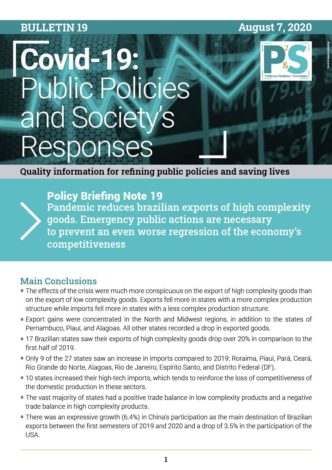Main Conclusions
- The effects of the crisis were much more conspicuous on the export of high complexity goods than on the export of low complexity goods. Exports fell more in states with a more complex production structure while imports fell more in states with a less complex production structure.
- Export gains were concentrated in the North and Midwest regions, in addition to the states of Pernambuco, Piauí, and Alagoas. All other states recorded a drop in exported goods.
- 17 Brazilian states saw their exports of high complexity goods drop over 20% in comparison to the first half of 2019.
- Only 9 of the 27 states saw an increase in imports compared to 2019: Roraima, Piauí, Pará, Ceará, Rio Grande do Norte, Alagoas, Rio de Janeiro, Espírito Santo, and Distrito Federal (DF).
- 10 states increased their high-tech imports, which tends to reinforce the loss of competitiveness of the domestic production in these sectors.
- The vast majority of states had a positive trade balance in low complexity products and a negative trade balance in high complexity products.
- There was an expressive growth (6.4%) in China’s participation as the main destination of Brazilian exports between the first semesters of 2019 and 2020 and a drop of 3.5% in the participation of the USA.
Work group responsible
Researchers:
- João P. Romero (Center for Development and Regional Planning – CEDEPLAR-UFMG)
- Elton Freitas (CEDEPLAR-UFMG)
We express our gratitude to BDMG for supporting the
research that served as the basis for this Technical Note.


